How Arts survived the Covid-19 Lockdown (so far)
Marcie Whitecotton, with files from participants - 15 March 2021
It has been one year since we entered lockdown and had to learn to do most things online in the Faculty of Arts. We asked students, staff members, lecturers and faculty members to tell us how the last year has been for them and to share their stories with you.
 When Covid19 hit, like most educators, I didn’t have any sort of a grasp on what this would ultimately mean for myself or my students. Fast forward a year, if I had to choose the one way the pandemic has changed my life the most, I would have to my job without a shadow of doubt. As I primarily teach language (Swedish and Norwegian at beginning and intermediate levels) and discussion-based literature courses, my classes tend to be lively and hands on. Also, because of the subjects I teach, I usually get to know my students quite well and vice versa. Prior to fall, my main concern about teaching online wasn’t the technological challenges, but how my interactive approach could translate online, if at all. Nearly two full terms in, the entire experience has been a mixed bag. While I think it’s gone fine overall, I do find it a bit flat. The students have been wonderful, but it’s just not the same. One thing this pandemic has taught me, however, is that I love my job more than ever before. I miss teaching in person and getting back to the classroom is my driving force. I crave daily interactions with students, the friendly banter before class and impromptu chats afterward. Breakout rooms have their efficacy, yet pale in comparison to in person human interaction, which is what I miss most and look forward to having again in the (hopefully) not too distant future! Until then we’ll soldier on.
When Covid19 hit, like most educators, I didn’t have any sort of a grasp on what this would ultimately mean for myself or my students. Fast forward a year, if I had to choose the one way the pandemic has changed my life the most, I would have to my job without a shadow of doubt. As I primarily teach language (Swedish and Norwegian at beginning and intermediate levels) and discussion-based literature courses, my classes tend to be lively and hands on. Also, because of the subjects I teach, I usually get to know my students quite well and vice versa. Prior to fall, my main concern about teaching online wasn’t the technological challenges, but how my interactive approach could translate online, if at all. Nearly two full terms in, the entire experience has been a mixed bag. While I think it’s gone fine overall, I do find it a bit flat. The students have been wonderful, but it’s just not the same. One thing this pandemic has taught me, however, is that I love my job more than ever before. I miss teaching in person and getting back to the classroom is my driving force. I crave daily interactions with students, the friendly banter before class and impromptu chats afterward. Breakout rooms have their efficacy, yet pale in comparison to in person human interaction, which is what I miss most and look forward to having again in the (hopefully) not too distant future! Until then we’ll soldier on.
Dr. John F. Eason III
Associate Lecturer Scandinavian Studies, Department of Modern Languages and Cultural Studies
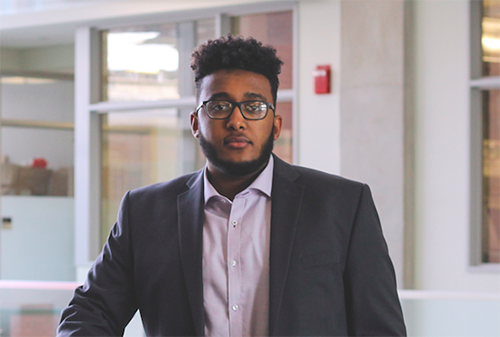 Working from home has been a unique, challenging, and rewarding experience this past year. I started my internship in May, which means that for the whole duration of my 12-month work term, I’ve been working remotely. This has been an incredibly unique experience for me because for one, I’ve never done this before, and two, it’s allowed me to take on more opportunities and experiences. Working from home has eliminated travel time and the physical exhaustion of being away from home for the day and this newfound energy and time has allowed me to take on different experiences like taking classes and joining a student group in addition to working full-time. Working from home has also been a challenging experience. In addition to everything that happened in our lives in 2020, striking a work-life balance has been difficult, particularly in the winter months. With COVID-19 and the Edmonton weather, it’s been tough not seeing people or enjoying warm weather. But most of all, I’ve found this past year to be rewarding. I truly found it amazing to see even through the drastic adjustment of working from home to see meaningful and fulfilling work still take place. Personally speaking, it has been rewarding for me because I’ve gained an immense amount of confidence having to work so independently and pushing myself to put out the best work possible in these extraordinary times.
Working from home has been a unique, challenging, and rewarding experience this past year. I started my internship in May, which means that for the whole duration of my 12-month work term, I’ve been working remotely. This has been an incredibly unique experience for me because for one, I’ve never done this before, and two, it’s allowed me to take on more opportunities and experiences. Working from home has eliminated travel time and the physical exhaustion of being away from home for the day and this newfound energy and time has allowed me to take on different experiences like taking classes and joining a student group in addition to working full-time. Working from home has also been a challenging experience. In addition to everything that happened in our lives in 2020, striking a work-life balance has been difficult, particularly in the winter months. With COVID-19 and the Edmonton weather, it’s been tough not seeing people or enjoying warm weather. But most of all, I’ve found this past year to be rewarding. I truly found it amazing to see even through the drastic adjustment of working from home to see meaningful and fulfilling work still take place. Personally speaking, it has been rewarding for me because I’ve gained an immense amount of confidence having to work so independently and pushing myself to put out the best work possible in these extraordinary times.
Nathaniel Haile
Student Recruitment, Engagement & Communications Intern, Faculty of Arts
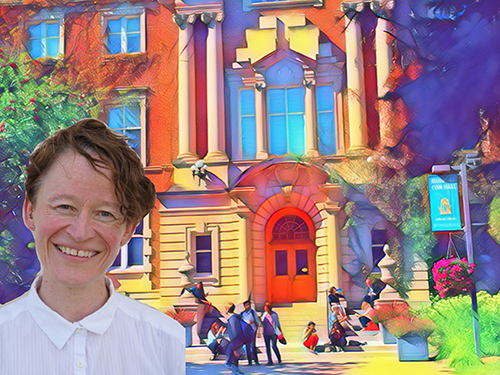 The changes I have experienced this past year have ranged from the banal to the transformative, but they have been no means singular. Like so many, in the first months of the pandemic lockdown, I felt overwhelmed by juggling remote learning for my elementary-aged children alongside steering my department members through uncharted teaching territory. Many afternoon meetings ended in a social hour where everyone talked over one another in an effort to replicate the normalcy of spontaneous in-person communication while we all tried to figure out Zoom (and its filters). Sidewalk drawings, window art, shaggy hair, virtual family reunions, and mask patterns were touchpoints of a shared global experience and new words entered our vocabulary (especially in German). On top of these day-to-day changes, I stepped into the role of Vice-Dean, and have been learning the ropes of a complex position in a complex time... virtually. This also means that some people I now interact with regularly I have yet to ever meet in person. But if COVID-19 has reminded me of the importance of connection, it has also reminded me that connection cannot be selective. I do not get to choose to feel camaraderie with colleagues struggling with their children’s remote schooling while ignoring the microaggressions and racism their children experience in online and physical classrooms alike. I do not get to joke with colleagues about our shared zoom fatigue and aching bodies from sitting too much without recognizing their pre-pandemic daily exhaustion of parsing out spoons. Even as the vaccines take hold and things open further, in the university, change will remain a constant. The appreciation of connection built over this past year will serve us well.
The changes I have experienced this past year have ranged from the banal to the transformative, but they have been no means singular. Like so many, in the first months of the pandemic lockdown, I felt overwhelmed by juggling remote learning for my elementary-aged children alongside steering my department members through uncharted teaching territory. Many afternoon meetings ended in a social hour where everyone talked over one another in an effort to replicate the normalcy of spontaneous in-person communication while we all tried to figure out Zoom (and its filters). Sidewalk drawings, window art, shaggy hair, virtual family reunions, and mask patterns were touchpoints of a shared global experience and new words entered our vocabulary (especially in German). On top of these day-to-day changes, I stepped into the role of Vice-Dean, and have been learning the ropes of a complex position in a complex time... virtually. This also means that some people I now interact with regularly I have yet to ever meet in person. But if COVID-19 has reminded me of the importance of connection, it has also reminded me that connection cannot be selective. I do not get to choose to feel camaraderie with colleagues struggling with their children’s remote schooling while ignoring the microaggressions and racism their children experience in online and physical classrooms alike. I do not get to joke with colleagues about our shared zoom fatigue and aching bodies from sitting too much without recognizing their pre-pandemic daily exhaustion of parsing out spoons. Even as the vaccines take hold and things open further, in the university, change will remain a constant. The appreciation of connection built over this past year will serve us well.
Carrie Smith
Vice Dean, Faculty of Arts
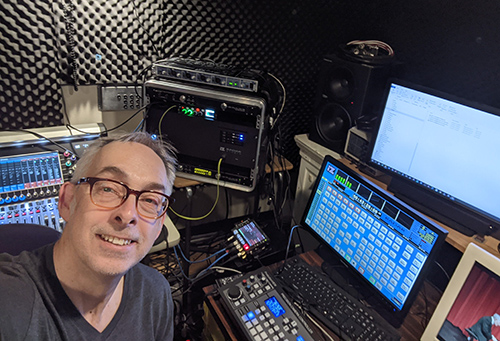 One of my primary roles with the Department of Music is support for our many concerts, recording sessions and other activities. In mid-March last year, nearly all our performances were immediately cancelled. Many of our remaining BMus graduating recitals and mainstage concerts were either live-streamed or pre-recorded and presented as post-streams. Convocation Hall transformed from a performance venue to essentially a very busy television studio.
One of my primary roles with the Department of Music is support for our many concerts, recording sessions and other activities. In mid-March last year, nearly all our performances were immediately cancelled. Many of our remaining BMus graduating recitals and mainstage concerts were either live-streamed or pre-recorded and presented as post-streams. Convocation Hall transformed from a performance venue to essentially a very busy television studio.
The Fall 2020 term was a complete shift to online classes with Zoom. However, music study, which involves playing or singing together in the same space with precisely the same time reference, was a major challenge. We had to find a way for students and accompanists to play together safely, essential for applied music student evaluations. For this, we created isolation rooms with two way audio and video communication with no time delay, utilizing older analog video technology, but with attention to the quality of sound and image in an attempt to recreate the live and in-person experience.
The winter term introduced hybrid teaching - another challenge for clear communication of musical expression between in-person students and those online remotely. The remainder of this Winter 2021 term will be jam packed with similar challenges, with heavy reliance on technology to help keep our students on their musical journey.
Prior to the pandemic, most of our efforts were in support of presenting and capturing live performance in front of audiences. For the past year we’ve been dedicated to supporting an environment that will keep our students on track with their development, despite the lack of audiences and with limited opportunities to create music with one another. The same goals; a completely different set of approaches.
Russ Baker, Production Coordinator, Department of Music.
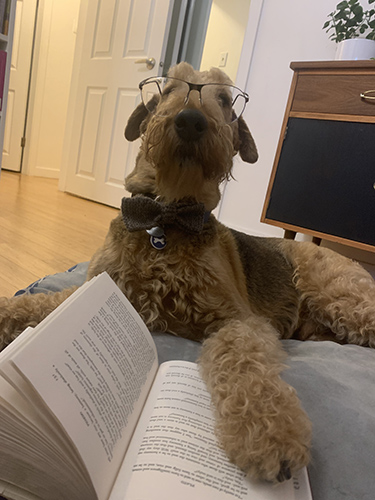 Reflecting on working in isolation, for me, involves balancing two impulses: one, to complain, and another, to write something less depressing. I’ve spent most of the year in a makeshift home office I share with my partner. We pause throughout the day to decide who is cooking supper, or commiserate over the unique kind of fatigue that follows recording yet another asynchronous lecture with no audience present to nod along or ask questions. When one of us is teaching a synchronous class, the other moves to the living room and tries to keep Charlie, our very noisy Airedale Terrier, quiet. When my partner is teaching, I cross my fingers and hope that during this hour there will be no neighbourhood dogs walking their owners past our front window and no squirrels darting across the lawn, starting Charlie howling at the top of his lungs. Designing a system that allows us both to work from home, or perhaps live at work, is exhausting. But, amidst the fatigue, I have also gained a much richer sense of academic community and support. In the best of times, I suffer from chronic depression. So, I realized last summer that if I was going to finish my dissertation now, during a global pandemic, I would need to find some kind of system or community that would help me do that. In September I asked my friends if they’d meet on Zoom every morning at 8 am to write together for three hours, and so, our writing group was born. A group of recently minted PhDs and graduate students in different timezones, the group has become a really rich network of support that I am sure will persist once we are all vaccinated, and for that I'm grateful.
Reflecting on working in isolation, for me, involves balancing two impulses: one, to complain, and another, to write something less depressing. I’ve spent most of the year in a makeshift home office I share with my partner. We pause throughout the day to decide who is cooking supper, or commiserate over the unique kind of fatigue that follows recording yet another asynchronous lecture with no audience present to nod along or ask questions. When one of us is teaching a synchronous class, the other moves to the living room and tries to keep Charlie, our very noisy Airedale Terrier, quiet. When my partner is teaching, I cross my fingers and hope that during this hour there will be no neighbourhood dogs walking their owners past our front window and no squirrels darting across the lawn, starting Charlie howling at the top of his lungs. Designing a system that allows us both to work from home, or perhaps live at work, is exhausting. But, amidst the fatigue, I have also gained a much richer sense of academic community and support. In the best of times, I suffer from chronic depression. So, I realized last summer that if I was going to finish my dissertation now, during a global pandemic, I would need to find some kind of system or community that would help me do that. In September I asked my friends if they’d meet on Zoom every morning at 8 am to write together for three hours, and so, our writing group was born. A group of recently minted PhDs and graduate students in different timezones, the group has become a really rich network of support that I am sure will persist once we are all vaccinated, and for that I'm grateful.
Daisy Raphael, PhD Candidate, Political Science
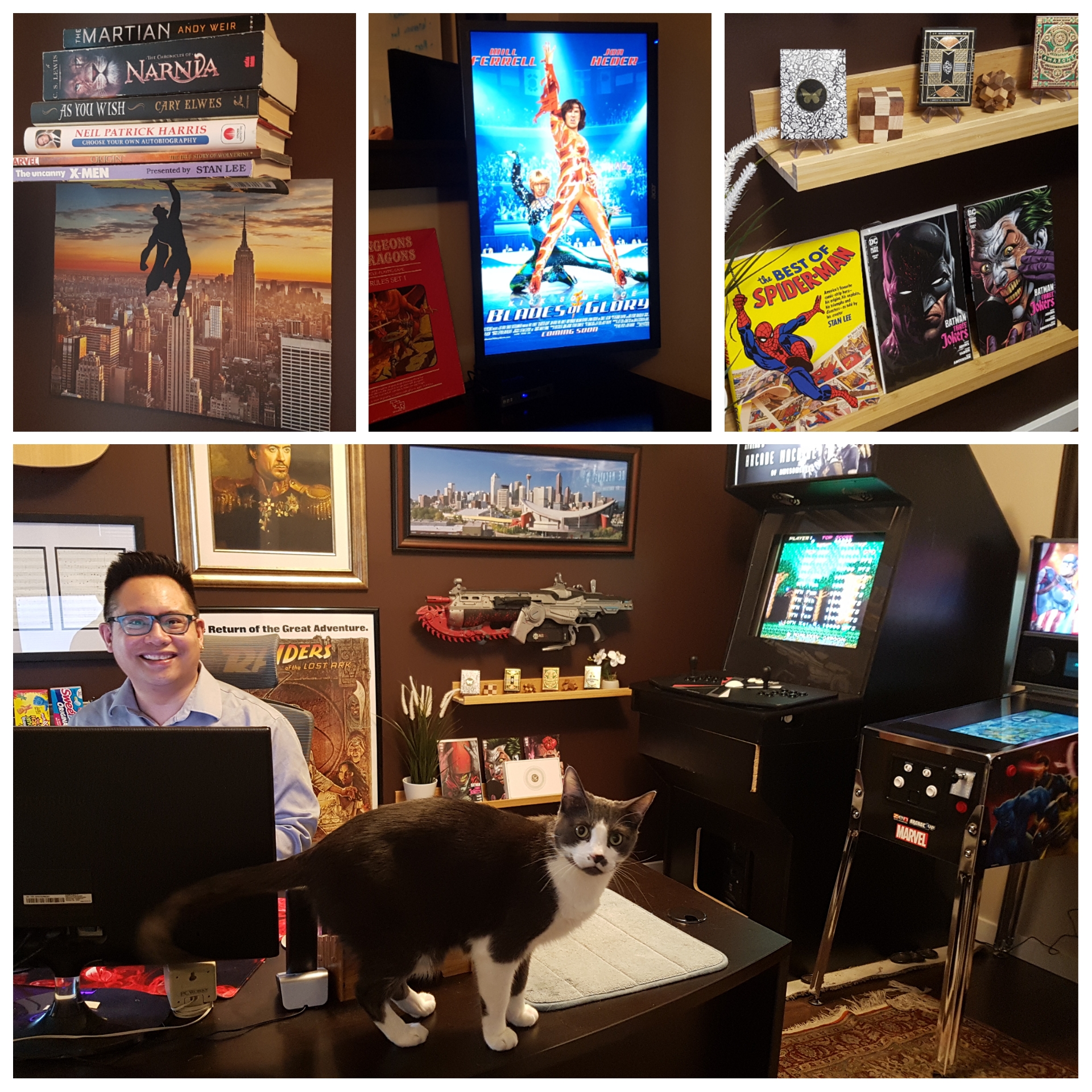 Top 5 reasons why working from home made this my favourite year
Top 5 reasons why working from home made this my favourite year
- My old 45-minute commute (which included car and LRT) became five seconds, from kitchen to home office. Seven, with heavy traffic.
- Since Zoom, we’ve all been living in a “from the waist up” world. I’ve been “business up top, pyjama party down below” since March 2020. I’m not saying this is why my productivity has increased, but I’m not NOT saying that either.
- My cat sleeps in my office and Zoom bombs all my meetings, which makes my co-workers smile. Having an office cat has made every day a “pet therapy” day, and I’ve never felt better.
- My home office (pictured) is the best workspace I’ve ever had. A digital frame randomly shows posters of my favourite movies. A mini “vending machine” keeps me in free snacks. Arcade games give me occasional breaks (I used to be really bad for never taking breaks). This space not only has what I need to do my job, but it’s filled with things which make it fun, inspires creativity, and actually bolsters my energy to work.
- Having all-day access to my own kitchen and home gym means I’ve been eating better and actually using my gym for something other than to hang clothes. I can’t believe it took a pandemic to teach me healthy work-life balance, yet here we are.
There are so many things I miss about being on campus (like my team) (... and NY Fries), but I’ve learned a lot about resilience, and the importance of mental health. This past year gave me a lot to be grateful for.
Erik Einsiedel, Marketing and Communications Associate, Faculty of Arts
Also check out Jaymie Heilman’s story about how she brought her exhibit, Hostile Terrain 94 to life during the pandemic.